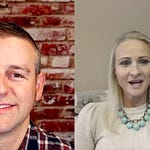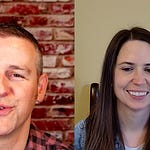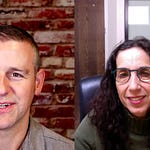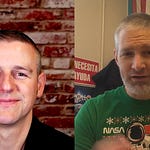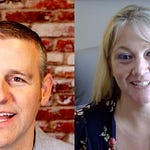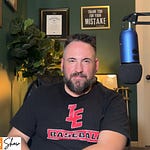The Knowledge Exchange, by Laura Stam on Substack
Recent topics:
Full Transcript:
Justin Baeder (00:00):
Welcome everyone to the Teaching Show. I’m honored to be joined today by Laura Stam to talk about knowledge building for teachers. Laura, welcome to the Teaching Show. Tell us a little bit about yourself and then we’ll get into it.
Laura Stam (00:14):
Hi Justin. Thanks for having me on the show. I’m really excited. I am Laura Sam. I teach third grade in Thermopolis, Wyoming, and I’ve been a Goan fellow last year. I’ve helped start our reading league in Wyoming chapter, and then I’d like to do podcasts and things like that. Yeah, mostly teaching though.
Justin Baeder (00:45):
Well, I think we’ve first met through your writing primarily on Substack and perhaps on social media as well. You’ve been working on a series since the beginning of summer on knowledge building for teachers. Tell us just how you got into that and what motivated you to start producing that series.
Laura Stam (01:03):
So I had been doing a lot of my own knowledge building. So we teach a knowledge building curriculum at our school, and there were several topics that I didn’t really feel like I knew very well, that I had not learned very well, and I really wanted to understand it more than just what the curriculum provided for that grade level. And so I started doing a lot of reading and studying myself, and I was noticing on social media that there was, because I think this is becoming more common, that we are bringing in knowledge building curriculum into teaching now. And I saw a lot of frustration from other teachers that they just didn’t really, and I think some of it was they just didn’t really feel prepared with the content either. And I thought, well, maybe I could start sharing the things that I’ve found and share this with them.
(02:06):
Because a lot of stuff out there and some of it’s great, some of it’s not. So I thought maybe I could then they’re not having to search everywhere. And then maybe, and I would have loved to have opened up a conversation as well with teachers, like what they’re learning. That was part of it too. So I just started building in these resources and specific to certain content areas. It started out mostly with history stuff, social studies type topics, and that’s what I did mostly over the summer, but it’s also morphed now into pedagogy and topics like that as well.
Justin Baeder (02:46):
Yeah, so you’ve got several articles on cognitive load theory and reading fluency and retrieval practice and different kind of science of learning topics. But yeah, a lot on specific social studies, content, math, content, the constitution, medieval Europe, colonial America, the Vikings, the War of 18, 12, things like that. Tell us a little bit more about your curriculum. You said you use a knowledge building curriculum in your district?
Laura Stam (03:11):
We use Core Knowledge. We started with Amplify, but I also bring in the original core knowledge content as well. I really like their history and geography content, and so I use both of those. I married both of them, but we’re also bringing in just with what they’re showing with the importance of reading whole books in school. We’re also bringing in literature which Core Knowledge has as well as part of their scope and sequence. They also have whole books that you should read as part of the curriculum, and so we’re bringing that in as well. It’s not just history and geography or just excerpts. So yeah, that’s what we use at our school, and it’s been a lot of fun. I started teaching in second grade using that, and then I’ve moved up to third grade. So it’s really fun to see that progression and that what you start in second grade builds into third grade, and what they got in first grade builds into second.
(04:15):
So what’s really neat is when you’re doing it as a school, seeing the students’ growth from year to year and the knowledge that builds on itself and how what they learn in first grade is important for them to understand in second grade and things like that. So we’ve been really enjoying it, and the children really enjoy it. It’s really neat to see the conversations that they’re having outside of school, or even at recess, they like to reenact some of the battles at recess. They go home and they do more research at home. It’s part of now the conversation that they have outside of just the lesson. So that’s really exciting to see.
Justin Baeder (05:00):
Well, Laura, this might seem like a strange conversation for us to be having to a time traveler from the eighties or nineties who might say, well, what’s special about this? What’s different about this? Why are you talking about building knowledge? Of course, that’s what schools do. You’re just talking about normal school, but of course we know today this approach is actually a little bit unusual. What do you see as the kind of default that differs from what you’re doing with building knowledge?
Laura Stam (05:26):
I think what’s where we kind of went was, especially when we got common court, especially in literacy, it started to focus on skills. Skills and skills are important. And so I’ve had to wrestle with this because our school is especially, we tie everything to a standard. It needs to be tied to a standard. And so I’ve had to wrestle with this and figure this out, but so with reading, it doesn’t have specific content that you should be learning like the ancient Rome and Ancient Greece or African Kingdoms or War of 18, 12 specific content like that. It doesn’t have that spelled out in there, but I think that really needs to be the focus is those, or even literature, we want them to be able to read these whole books like Charlotte’s Web or other books like that. And so trying to mesh those together in a way that is productive for both things. So when I’m reading a whole book, the goal is that they understand all the nuances of that story. They know the characters and what they’re doing and what that story was trying to tell them. But those standards are also important to help bring a focus to what you wanting them to get out of that book. So both of those things are equally important.
Justin Baeder (06:50):
I’ve been thinking about just the emphasis on skills and the reluctance to emphasize specific content. I saw an article from I think Australia the other day where a group of students had accidentally been taught about the wrong Caesar, and now they were worried about a test that they had to take at the end of the course. And I thought, we wouldn’t have that problem in the US because we don’t test kids on specific Caesars. We couldn’t even have that problem, but why are we not testing kids on specific content that we’re teaching? It’s just a strange thing that’s happened over the last couple of years. And I think you’re right that the skills that are in many of our standards now, the Common Core state standards, the next Generation Science standards, largely, those are good skills. I haven’t seen any that I think are objectionable, but they’re not things that we teach directly. We teach them through the content. But I think we kind of missed that memo as a profession and started trying to teach the skills directly and leaving out the content because we got this idea that content doesn’t matter. What matters is the transferable skills. Well, now we’re realizing, oh, you actually can’t teach those skills without any content. So the curriculum you’re using is very, very content rich.
Laura Stam (07:56):
So bringing back in whole books too is very important. I think that we took that out. They’re just reading excerpts and we’re finding that that’s a stamina piece. But the whole purpose of it is that we want them to understand the whole story, the characters and what they’re trying to get out of that story. And so those skills are important for understanding that and helping focus because there’s so many directions you can go. Right now we’re doing Charlotte’s Web and I mean, it’s an amazing piece, but there’s so many places we could go. So those standards and skills really help bring a focus. So the teacher isn’t trying to teach everything, but at the forefront should always be, I want them to understand Charlotte’s Web. I want them to know ancient Rome and who Julius Caesar was and who Caesar Augustus was. And I want to know how did it progress from a republic to an empire?
(08:55):
Then how did that fall? And then how does that tie to what they learned in ancient Greece? How does that tie to the Athenian government? And then how does that tie to our government when we’re learning about American history? The main idea learning, main idea or learning historical progression isn’t going to help them learn that without the knowledge to work with. What is that saying? You can’t connect dots if you don’t have any dots to connect. And so those skills are useless without content, but content is served very well by those skills. And so I think I finally found a good marriage between those two because it felt like they were in conflict. But I think they are important. But I think our focus so much was on, well, all we have to do is focus on just teaching the main idea, and then they’ll be able to find main idea.
(09:50):
And I feel like all our tests are, it’s on main idea and inferencing and character development, but that should not be the goal of our test. Our tests should be, do they understand ancient Rome and can tell you about it? Do they know who all the main players are and do they know who Charlotte and Wilbur are and what dynamic they have in this story? So it’s a big mind shift, and I see it a big struggle too, to try and weed that out. But I think when we put the content forward, then it’s also, you just really see a difference in the students and how they interact with that knowledge. They love knowing things, and they love being able to talk about the knowledge that they have. And you’re not going to get that if that is not your focus, if your focus is on the skill.
(10:49):
And so that’s what the point of my substack was, was just to really help teachers. Well see. And that’s the problem, is it’s hard to teach that well if you don’t know it well, and I don’t feel like I really got that very well, and my education, and I have a feeling that’s probably true for a lot of teachers. So we’re having to teach ourselves and we need to know it a lot more in depth than the curriculum gives us. And so that’s what I was trying to do with my substack is give them those more in depth resources. And some are quick. I wanted to give them a quick podcast or a quick webinar, but also really, really nerdy stuff if you really like it. So anyway, just give them a mix of resources that really quick, they could just get a good quick overview of what’s going on at a teacher level, but then if they want to really dig deep, then they can, I heard this really good webinar just to help you grow your knowledge over time.
(11:55):
One summer, just read this really thin book and here’s this little quick book. Read that on the American Revolution. And then the next summer, then here’s this fatter, more in depth, more specific book. And then the next summer, you have these two volumes that are really research based, really in depth knowledge about that topic. But just over time, you can grow your own knowledge. We don’t have a lot of time. Plus, if you’re an elementary teacher, you also have to do math and all the other topics. So there’s a time thing in there. So that was my goal with it, is to, here’s some resources on however quick or deep you want to go. Then you can have these, and you’re not having to search for them yourself, because that’s hard too.
Justin Baeder (12:42):
I noticed you’ve aligned each of your articles, your collections of resources to specific units that you’ve taught from the Core knowledge curriculum. Is that right?
Laura Stam (12:50):
Correct. Yes. And so all tied to that, but I’m hoping, I feel like there’s some similarities between other knowledge building curriculum. I’m hoping. I haven’t really looked at other ones, but I’m assuming, especially with history related stuff, it feels like we all kind of have the same kind of topics. So the goal is if you do teach Core knowledge, it ties specifically to these lessons. But if you have another curriculum, if you teach ancient Rome or you teach the American Revolution, then those resources should be accessible to you as well. Yeah, yeah.
Justin Baeder (13:29):
Well, Laura, you mentioned earlier that kids love learning stuff. Their faces really light up when they get to learn this specific content that maybe it’s not so common to teach anymore. What has been your reaction personally to delving into this content knowledge and going deeper with things that maybe you knew about but are really taking to a new level in terms of your content knowledge?
Laura Stam (13:49):
Well, I love it. I’m a total nerd. I think the reason is because I just felt like I was missing a lot of things. And so I think because of that, I’ve always had a deep hunger for wanting to fill that gap. I didn’t like that. I didn’t have certain knowledge that I wanted, and I felt like when I would listen to conversations of other people, that I was really lacking some information that I wanted to have. And so it has been a lot of fun for me. I kind of spend my whole summer digging really deep into specific topics since, like I said, I’ve moved from second to third, and because I learned Move to Third is a whole new content area. So one of them is Ancient Rome and Carthage, Hannibal and Carthage. So I just found a book about Carthage, this really thick book, and it was a lot of fun.
(14:44):
And you learn so much good stuff. And what’s really nice is there are a lot of really good writers out there. It’s not just facts and information, really good storytellers. So when you’re reading these stories, real history stories, but they’ve written them in such a way that it’s like reading a novel. So that’s a lot of fun. I really like that. But there’s a lot of good podcasts where people talk about these things that are really short, but you get so much out of them because they just have a lot of knowledge. So that’s a lot of fun. And then some really great webinars too that I’ve really enjoyed. And they’re only 30 minutes, but it’s a lot of fun, I think, because the people who are teaching it love it. And so they exude that excitement for their content that they are really passionate about. So then you kind of pick up on that passion, and then hopefully what you’re doing is you’re also sharing that passion with your students. So that’s kind of the whole goal too, because when you know something and it really well, and maybe it’s not your most favorite topic, but even if you know it well, that comes out for your students. And then that makes them excited to learn it too, because this really well, and you are excited about it. So that’s my journey. Yeah.
Justin Baeder (16:08):
Well, Laura, thank you so much for joining me here on the teaching show. If people want to find your substack or connect with you, where’s the best place for them to go?
Laura Stam (16:15):
On Substack, I think it’s just my name, Laura Stam, but the Substack is called The Knowledge Exchange. And then I’m also on Twitter.
Justin Baeder (16:25):
Laura, thank you so much for joining me. It’s been a pleasure.
Laura Stam (16:26):
Yeah, thank you. Thank you. This was great.






